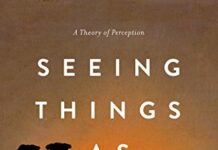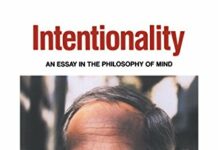
Ebook Info
- Published: 2004
- Number of pages: 326 pages
- Format: PDF
- File Size: 1.66 MB
- Authors: John R. Searle
Description
The philosophy of mind is unique among contemporary philosophical subjects, writes John Searle, “in that all of the most famous and influential theories are false.” One of the world’s most eminent thinkers, Searle dismantles these theories as he presents a vividly written, comprehensive introduction to the mind. He begins with a look at the twelve problems of philosophy of mind–which he calls “Descartes and Other Disasters”–problems which he returns to throughout the volume, as he illuminates such topics as materialism, consciousness, the mind-body problem, intentionality, mental causation, free will, and the self. The book offers a refreshingly direct and engaging introduction to one of the most intriguing areas of philosophy.
User’s Reviews
Reviews from Amazon users which were colected at the time this book was published on the website:
⭐Another good book from a good philosopher, Searle’s review and proposals concerning the philosophy of mind. He sets out reviewing the dominant threads in the development of philosophy of mind noting and striking at their particular weaknesses. Searle dismisses property and substance dualism but also strikes at the weaknesses of various branches of materialist thinking on the subject. He then proposes his own theory, one that is fundamentally materialistic (physics being for Searle the ultimate basis of all things), but different in that it takes mental properties seriously but rests them firmly on what amounts to “the power and functional purpose of brains”.Searle is an honest philosopher. He states his assumptions, makes clear his reasoning, and knows when his approach to the subject hits a wall that he has not (perhaps yet) found a way round. In this book, like everyone else, he cannot reduce-away the gap between the objective ontology of brains and the subjective ontology of experience. He points out that while every other phenomena in the physical universe can be both logically and physically reduced to some more fundamental phenomena, subjective experience cannot be logically reduced precisely because it is subjective while everything else is objective, public. Of course he assumes that there is some underlying, solely physical, foundation which will become known in time.The book covers consciousness taken as a whole, a gestalt, and also intentionality (the “about-ness” of our thinking), the aspectral nature of all consciousness, emotions, desires, beliefs, and with these also acts: decisions and volitional control of the body. There is also a chapter on the unconscious, and that too fits perfectly well into his view of what mind is.Searle runs into two other barriers not normally acknowledged by other philosophers. In a chapter on [libertarian] free will, he says that from a psychological point of view, free will must be real, but from his own view that consciousness is just what the brain does in the same sense that kidneys filter blood, he admits that he cannot figure out how free will could work. He alludes to a popular view that quantum mechanics might have something to do with this, but is honest enough to admit that this idea still does not really answer the question.The other barrier is that of personal identity, the conviction that although my body and character change I remain, to myself subjectively, the same person today as I was a month or a decade back and that I can plan for the future when, presumably, this same person will still be around to enjoy the fruits of present labor. Here he addresses the “continuity of memory” theory to personal identity and accepts that this is important but is insufficient to explain the phenomenon. That these are MY memories still presupposes some “I” whose memories they are. He denies the “I” is substantive, but merely a functional hypothesis that we must have to make experience intelligible. He admits that he does not know how to get deeper into it than that.The book is well written (could Searle do otherwise?) with little formality. His assumptions and arguments are clearly made in plain English. It isn’t an encyclopedic introduction to the philosophy of mind, but it does touch briefly on the main threads of the field as explored by Western philosophers for the past 300 or so years. His own theory, well expounded, illustrates how subtle and problematic some of the questions in the field can be. A good read. Highly recommended.
⭐Searle is, of course, a prolific commentator and one of his favorite subjects is the mind, consciousness, and the manner in which we might conceptualize them. Here he pulls together ideas from previous works on the discrete aspects of the notion of ‘mind’ and presents them, with additional material, as a general introduction to the subject. This is not a textbook for philosophy students (though it could be used in that way) but more an introduction for the educated general reader.Each chapter contains a handful of references to further material, but while Searle’s reflections are based on extensive knowledge of the epistemology/neuroscience literature, he does not generally make explicit reference to discrete items within that literature. He will specify an issue, explore the manner in which it has been conceptualized, elucidate problems, itemize pro’s and cons, and so on, but not offer detailed information on those issues beyond their articulation in the thought of a handful of significant philosophers (i.e. Locke, Berkeley, Hume, Kant, et al.). Hence the book is an excellent introduction but not a useful ‘text’ for further reading and exploration by professional philosophers.Searle makes the material as clear as one can, given the level of explanation which he offers. His examples are often witty and humorous and he is explicit with regard to what he believes, what others believe and the degree of certainty which undergirds his positions. At several points he acknowledges that his answers are less than fully satisfactory, given the nature of the issues and the extent of our current knowledge (particularly with regard to neurobiology).The book consists of 11 chapters that focus on such issues as materialist explanations, the problem of consciousness, intentionality, free will, the unconscious, the nature of perception and the notion of the self. A three-page epilogue (“Philosophy and the Scientific World-View”) summarizes his general orientation.The book will be challenging for readers who are not already familiar with the history of modern philosophy, the thought of principal thinkers, and the basic thought of evolutionary psychologists, neuroscientists, et al. A knowledge of Descartes (where so many of the issues and problems begin) and the British empiricists would be especially helpful. While Searle does not utilize jargon for jargon’s sake he does use basic philosophic terms. The real complexity comes when he explores multiple dimensions of a particular issue and explores the arguments that have been used, the positions taken, the schools of thought, the relative forcefulness of individual ideas and the soft underbellies of others. Beginning with a single subject you are suddenly plunged into 10-15 facets of it, each of which carries its own subtleties and, in some cases, its own terminology.As Tom Stoppard entitles his most recent play on the subject, consciousness is the “hard problem.” Searle elucidates it with as much clarity and finesse as the general reader can reasonably ask.
⭐Rubbish book! I don’t recommend – it’s utterly uninteresting and badly written.
⭐Very slight reservations – I’m not surer Searle quite understands some of the difficulties that the new student to philosophy of mind experiences, especially as getting across an interpretation of mind as material. Perhaps I was expecting too much. Nevertheless, warmly recommended and of the three books I’ve read covering similar ground, I think it is the best.
⭐Good book for BSc Psychology students
⭐Searle is a brilliant philosopher, and in this book brings philosophy into the real everyday world.I recommend it, as a readable, direct, and dazzling account of the human mind.
⭐A introduction to the philosophy of mind… A lesson-series is also available on YouTube
Keywords
Free Download Mind: A Brief Introduction (Fundamentals of Philosophy Series) in PDF format
Mind: A Brief Introduction (Fundamentals of Philosophy Series) PDF Free Download
Download Mind: A Brief Introduction (Fundamentals of Philosophy Series) 2004 PDF Free
Mind: A Brief Introduction (Fundamentals of Philosophy Series) 2004 PDF Free Download
Download Mind: A Brief Introduction (Fundamentals of Philosophy Series) PDF
Free Download Ebook Mind: A Brief Introduction (Fundamentals of Philosophy Series)




